Academic articles and book chapters
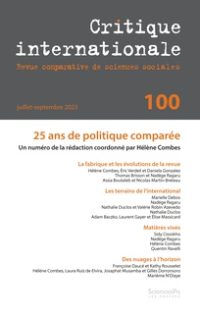
“Gender, Safety, and Ethics: Vade-Mecum for Fieldwork”, Critique Internationale, n°100, 2023/3, pp. 59-73.
The concrete and material questions that arise in the field are not detached from theoretical, methodological, and ethical issues. This article is divided into two parts: the first is an introduction to gender, safety, and ethics in the field; the second is a vade mecum with advice on how to protect both the researcher and his or her interlocutors, with a focus on gender-based and sexual violence. I argue that women researchers need to reinvent a way of thinking and doing fieldwork and to navigate between paternalistic injunctions for them to be careful and denial of the difficulties they encounter. Safety at the university and in the field (especially for women and minorities) also requires an analysis of the effects of precarity in academia as well as of the persistence of norms (sexism, fetishisation of dangerous fields, idealisation of ethnographic immersion) that put researchers in danger.
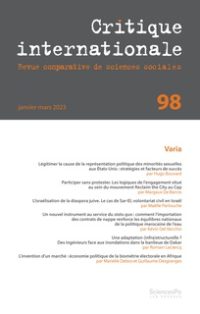
“L’invention d’un marché : économie politique de la biométrie électorale en Afrique”, Critique Internationale, n° 98, 2023/1, pp. 117-139, with Guillaume Desgranges.
The Invention of a Market: The Political Economy of Biometric Voting in Africa
Biometric voting developed in Africa during the 2000s. The technology is now used for voter identification in over half of African countries. Our research aims to make sense of the invention of this market. The study is based on the combination of two methodologies. On the one hand, we compiled a database of the election technologies used in each African country and of the companies that sold them. On the other hand, we engaged in qualitative research, including interviews and ethnographic observations. We show that the biometric voting market has been shaped not only by corporate interests. The market is also influenced by normative ideas as well as by the knowledge and know-how of actors with diverse backgrounds: donors, democracy professionals, and African political personnel. By adopting a political economy approach, we show how this market is embedded in postcolonial logics, and ultimately bring to light the enduring legacies of the former French empire.
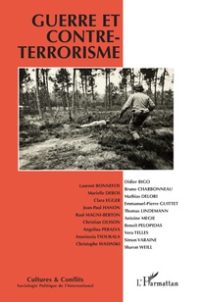
“De la ‘guerre contre le terrorisme’ aux guerres sans fins : la co-production de la violence en Afghanistan, au Mali et au Tchad”, Cultures et Conflits, n°123-124, with Bruno Charbonneau, Jean-Paul Hanon, Christian Olsson, Christophe Wasinski, pp. 15-30.
What are the effects of armed interventions carried out in the name of the “war on terror”? Based on localized case studies in Afghanistan, Mali, and Chad, the article invites us to rethink the underlying conceptions of interventionism and shows why the “war on terror” cannot be “won” in the classical sense of the term. Instead, it shows how the “war on terror” contributes to perpetuating conflicts and undermining their resolution. While each configuration is unique, similar processes of conflict perpetuation and co-production of armed violence by a range of international and local actors can be found in all three countries.

“Guerre et contre-terrorisme : introduction du dossier”, Cultures et Conflits, n°123-124, 2021, with Didier Bigo et al., pp. 11-19.
Introduction to the special issue on War and Counter-terrorism
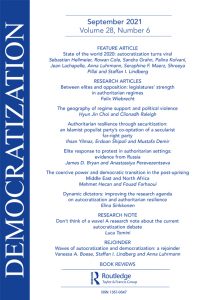
“Biometrics and the disciplining of democracy: Technology, electoral politics, and liberal interventionism in Chad”, Democratization, Vol. 28, n°8, 2021, pp. 1406-1422.
In a large number of countries in Africa, biometric identification technologies have become a key element of voter registration procedures. Based on an in-depth study of biometric voter registration in Chad, a country marked by a long history of political violence, the article explains how the technology has been construed as a “solution” to address a situation labelled as a political crisis. To make sense of the unlikely introduction of biometrics in Chad, two main elements are considered: the socially constituted belief in the potential of biometrics and – paradoxically – the unfulfilled promises and fallibility of that same technology. Combining the literature on biometrics, election technologies, and liberal democracy promotion, the analysis concludes that biometric voter registration is a disciplining technology. In addition to capturing the personal data of individuals, it fosters the framing of democracy in narrow technological and procedural terms.
For an op-ed based on this research: “The productive failures of biometric voting in Africa”, Democracy in Africa, June 2021.
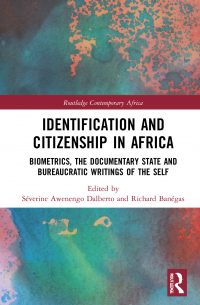
“Legible bodies and lives: How a biometric registration campaign reinvented the Chadian population”, in Awenengo Dalberto Séverine, Banégas Richard (eds.), Identification and citizenship in Africa: Biometrics, the documentary state and the bureaucratic writings of the self, Routledge, 2021, pp. 65-75.
Biometric identification is not just a more technologically advanced form of identification: it implies a radically new conception of what constitutes a person’s identity. Based on the case study of the first biometric voter registration in Chad, this chapter shows that such large-scale registration schemes are not a neutral operation. They reinvent the population and render lives and bodies more ‘legible’, even more so in a state that until recently had little interest in the population and no detailed, individualized information about it. I argue that lives and bodies have undergone two distinct, yet related, stabilization or fixing processes: on the one hand, the bureaucratic rationalization of names and biographies, and on the other, the capture of body features to meet standardized global norms. Ultimately, it shows that the collection of biometric and biographic data does not automatically strengthen the state’s surveillance abilities and is not sufficient to radically modify the mode of government.
Video presentation of the chapter.
Video presentation of the edited volume.
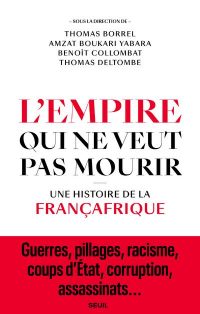
“La France au Tchad, l’opération militaire permanente”, in Borrel Thomas, Boukari-Yabara Amzat, Collombat Benoît, Deltombe Thomas (eds.), L’Empire qui ne veut pas mourir : Une histoire de la Françafrique, Paris, Le Seuil, 2021, pp. 543-552.
This chapter focuses on French policy in Chad in the 1980s. It shows that there was little to distinguish Mitterrand’s foreign policy from that of his predecessors: a policy of containment of Libya, a nationalistic refusal of American interference in the country’s territory, an attachment to the myth of French power, but also support for allies who governed through violence. Although the extent of the brutality of Hissène Habré’s regime was not established until after his overthrow in December 1990, France could not ignore that widespread and systematic crimes were being committed.
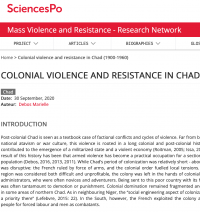
“Colonial violence and resistance in Chad (1900-1960)”, Mass Violence & Resistance, Online Peer-Reviewed Journal published by Sciences Po, September 2020.
Also in French: “Violences coloniales et résistance au Tchad (1900-1960)“
While Chad’s colonial period was relatively short (about 60 years), it was marked by violence. In this region considered both difficult and unprofitable, the French ruled by the force of arms. The article is a review of existing works on armed repression and mass violence under colonial rule. It shows that Chad remains an under-studied country. While some episodes of armed repression and mass violence have been studied, and remain in the collective memory, others have never been thoroughly researched. The article points out what is known (or not) about the various outbreaks of mass violence and which historical events are yet to be documented.
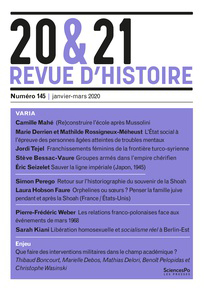
“Que faire des interventions militaires dans le champ académique ? Réflexions sur la nécessaire distinction entre expertise et savoir scientifique”, 20&21 Revue d’histoire, 2020, n°145, with Thibaut Boncourt, Mathias Delori, Benoît Pélopidas, Christophe Wasinski, pp. 135-150.
Segments of the academic field are partly funded by the Ministry of Defence and the arms industries. This trend is currently reaching a new high in France, while regular funding is declining. This article discusses the impact of the militarization of research funding on scholarship. The general argument is that this dynamic continues to blur the distinction between two types of knowledge that draw upon distinct epistemological projects: research in the humanities and social sciences on the one hand, and think tank-based expertise on the other. Our argument is based on two case studies: American and British research on so-called “strategic” bombings, and French research on nuclear issues.
For an op-ed based on this research, “French social sciences go khaki under increasing military influence”, Open Democracy, June 2019.
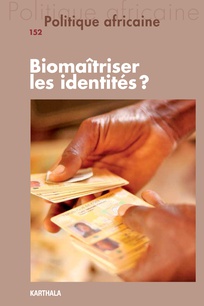
“La biométrie électorale au Tchad: Controverses technopolitiques et imaginaires de la modernité”, Politique africaine, n° 151, 2018, pp. 101-120.
Biometric identification technologies are increasingly used in elections in Africa. They have been sold as a way to fight fraud. Based on the case study of voter registration in Chad for the 2016 presidential election, this article examines how a biometric imaginary has developed that pits the supposed rationality and neutrality of technology against the perversion of politics. It shows that while biometrics has been construed as a necessity and a “solution” to the political crisis, it has been repoliticized by controversies over the choice of the “right” technology, its uses, and the role of international actors, including French firms.
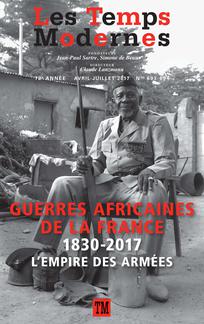
“L’autre pays des ‘guerres sans fin’ : Une histoire de la France militaire au Tchad (1960-2016)”, Les Temps Modernes, n°693-694, 2017, pp. 222-266, with Nathaniel Powell.
This article traces the history of French military rule in Chad from independence to the present. It shows that Chad, as the “march” of the former French Empire and the “keystone” of the security architecture of post-colonial French policy, has been a privileged terrain for military France for more than a century. If the regional and global context, the motivations and justifications for military interventions have changed, one can identify recurrent logics of French policy in the country: little interest in the resources and economy, construction of the country as a “strategic space”, as well as interference in conflicts in the name of the necessary “stability” of the region.
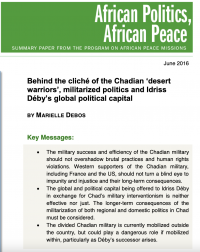
“Behind the cliché of the ‘desert warriors’: Militianization and impunity of the Chadian armed forces”, African Politics, African Peace, Paper n°22, World Peace Foundation, 2016.
The military success of the Chadian military overshadows brutal practices and human rights violations. While Western supporters of the Chadian military, including France and the US, are aware of these violations, they turn a blind eye to impunity and injustice and their long-term consequences. Ultimately, they support the militarization of both domestic politics in Chad and the sub-region.
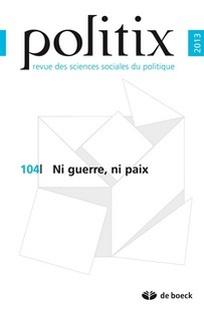
“La guerre des préfets : Répression, clientélisme et illégalismes d’État dans l’entre-guerres tchadien”, Politix, n°104, 2014, pp. 47-66.
Studies of state administration have occupied a prominent place in social sciences. However, current literature offers little understanding of its functioning in states governed by violence. The article seeks to provide an analysis of the formation and practices of local administration in Chad. How does the local state govern the inter-war, i.e. the spaces and times which are affected by a violent mode of governing and where war remains on the horizon? The article shows how clientelism, state illegal practices and predation (as a result of impunity granted to local state officials) are a form of continuation of the war. State violence is all the more efficient that it is combined with the local state’s firm grip on people’s daily life. Such an administration is not simply dysfunctional; it is linked to a historically grounded mode of governing. Beyond the case of Chad, the article interrogates insidious forms of violence hidden by apparent stability or peace.
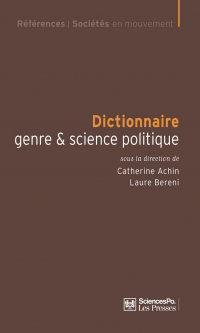
“Conflits armés”, in Achin Catherine, Bereni Laure (eds.), Dictionnaire genre et science politique : Concepts, objets, problèmes, Paris, Presses de Sciences Po, 2013, pp. 103-114.
The field of studies on armed conflict has opened up to gender issues, first with the English-speaking literature and more recently with the French-speaking literature. While research in this field initially focused on violence against women and developed a radical critique of the links between male domination and the militarization of societies, the recent research also studies women not only as victims of conflict but also as combatants. In addition, this field of study has intersectional analyses crossing gender, race and class.
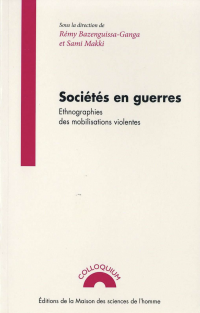
“Quand les ‘libérateurs’ deviennent des ‘bandits’ : Guerre et marginalisation sociale à la frontière tchado-centrafricaine”, in Bazenguissa-Ganga Rémy, Makki Samy (eds.), Sociétés en guerre : Ethnographies des mobilisations violentes, Paris, Éditions de la Maison des Sciences de l’Homme, 2012, pp. 93-110.
While wars are organized by political entrepreneurs, they also mobilize a low-cost combatant workforce. This article contributes to the research on violence as labour. It is based on fieldwork conducted in a refugee camp in Chad with former “liberators” who were recruited as combatants in 2003 in the Central African Republic. It shows how war engagement is linked to different forms of marginality and vulnerability – not only economic, but also political – and how the experience of war can reinforce, in the post-war period, the marginality of those who live it.
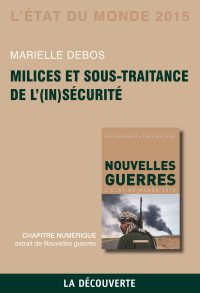
“Milices et sous-traitance de l’(in)sécurité”, in Badie Bertrand, Vidal Dominique (eds.), L’Etat du Monde : Nouvelles guerres, Paris, La Découverte, 2014, pp. 129-134.
Originally referring to citizens occasionally mobilized by the state, the term “militia” is now used to refer to armed groups that have little in common. After an analysis of the main approaches to militias in war-torn societies, this article examines the blurred boundary between regular forces and militias. The last part resituates the formation of militias within global modes of production and regulation of violence.
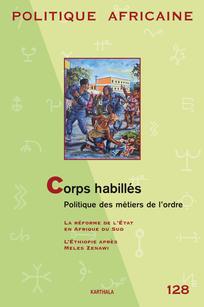
Special issue: “Politique des corps habillés : Etat, pouvoir et métiers de l’ordre en Afrique”, Politique africaine, n°128, 2012, with Joël Glasman.
Violent repression, mutinies, coups d’état: the “corps habillés” regularly appear on the news. With the multiplication of “security sector reform” (SSR) programs, law enforcement professionals are now the object of much international attention. Yet little is known about the military, police or forest guards who carry out their work in uniform or in civilian clothes, on the street or in an office. What knowledge, practices and conflicts are specific to this professional field? By moving away from the perspective of “professionalization” that marks SSR expertise, this special issues shows that the law enforcement institutions are central instruments of surveillance and repression as well as contestation of state power . Based on case studies in Senegal, Nigeria and Sierra Leone, this issue invites us to think about the relationship between law enforcement and the state by studying both their ordinary functioning and the most spectacular expressions of political action.
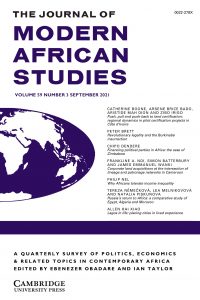
“Living by the gun in Chad: Armed violence as a practical occupation”, Journal of Modern African studies, Vol. 49, n°3, 2011, pp. 409-428.
This article explores men in arms’ conceptions of armed violence in a country which has been prone to a violent cycle of rebellion and repression. Based on ethnographic research in Chad, it analyses combatants’ life trajectories in an unstable political environment and a militarised economy. It moves beyond rebellion towards an analysis of the most mundane patterns of the activities conducted by men in arms, to understand what is at stake beyond times and spaces of war. It argues that armed violence is an ordinary way of expressing contestation, as well as a practical occupation or métier, a French word that indicates a non-institutionalised profession.
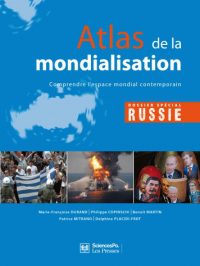
“Un système régional de conflits : Darfour, Tchad, République centrafricaine”, in Durand Marie-Françoise & al., Atlas de la mondialisation, Paris, Presses de Sciences Po, 2010.
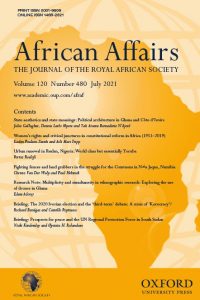
“Fluid loyalties in a regional crisis: Chadian combatants in the Central African Republic”, African Affairs, Vol. 107, n° 427, 2008, pp. 225-241.
This article examines a neglected pattern of the regional crisis in Darfur, Chad, and the Central African Republic: the cross-border activities of combatants with fluid loyalties. The trajectories of Chadian ‘ex-liberators’ in CAR, which have been little documented, are used to illustrate the regional movements of armed men. The article explains how unemployed Chadian soldiers were recruited to fight with François Bozizé in CAR and why many of them joined other armed groups after Bozizé’s takeover. The reconversions of armed combatants, who may easily shift allegiance and cross borders to carry on with their ‘politico-military careers’, is thus a structural characteristic of the current conflict, which has major implications both at the local and transnational levels. The article concludes that freelance military entrepreneurs’ trajectories are crucial in understanding the unfolding of this regional crisis.
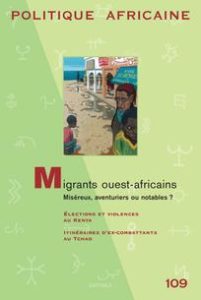
“Les limites de l’accumulation par les armes : Itinéraires d’ex-combattants au Tchad”, Politique africaine, n°109, 2008, pp. 167-181.
War may be a lucrative activity. While opportunities to live from the gun are numerous in Chad, only a small group of men in arms who have access to the state achieve upward social mobility. This article analyses ex-combatants’ paths of (non-)accumulation and shows that the men in arms’ professonnial field is neither anarchical nor profitable for all those who are seeking opportunities for social advancement.
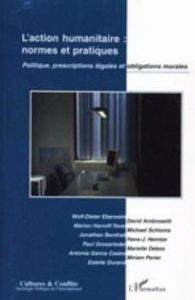
“La création de la Cour Africaine des Droits de l’Homme et des Peuples : Les dessous d’une ingénierie institutionnelle multicentrée”, Cultures et Conflits, n°60, 2005, pp. 55-82.
The article studies the institutional engineering of the African Court on Human and Peoples’ Rights and shows the central role played by NGOs: they gave the initial impulse, orchestrated the mobilization, played a key role in the negotiations and the adoption of the Protocol. A critical perspective on this mode of producing law reveals the logics of power pervading the “multicentric world”. The professionalization of NGOs and the autonomization of this field go hand in hand with the marginalization of local activists. Law production is taken up by legal experts with close ties to state diplomacies and intergovernmental organizations.
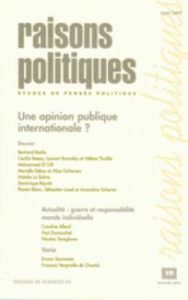
“Les ONG et la fabrique de l’opinion publique internationale”, Raisons Politiques, n° 19, 2005, pp. 63-80, with Alice Goheneix.
Essays
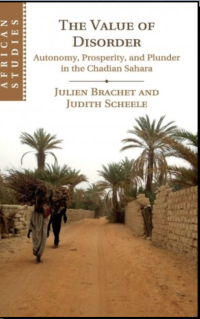
“The social sciences in the face of disorder”, Books and Ideas, 2022.
How can social sciences think through the constitutive disorder of a society? When groups marked by “bad reputation” refuse to be an object of knowledge, how can we write about them? This is the challenge presented to researchers by the Tubu of Chad.
About Julien Brachet, Judith Scheele, The Value of Disorder: Autonomy, Prosperity, and Plunder in the Chadian Sahara, Cambridge University Press, 2019.
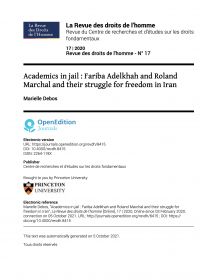
“Academics in jail: Fariba Adelkhah and Roland Marchal and their struggle for freedom in Iran”, Revue des droits de l’Homme, n°17, 2020.
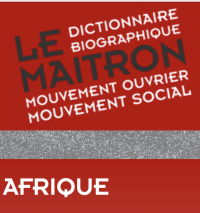
“Acheikh Ibn Oumar”, Maitron Afrique: Biographic dictionary of mobilizations and contestations in Africa, 2022.
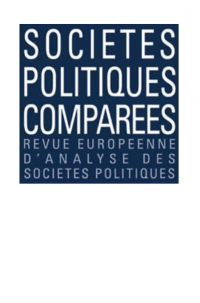
“A tribute to Roland Marchal”, Democracy in Africa, with Tatiana Carayannis, Delphine Kemneloum Djiraïbé, Louisa Lombard, Didier Péclard, Sandrine Perrot, Enrica Picco, 2020.
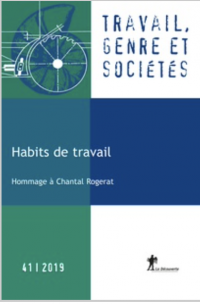
“Regard sur le genre de la guerre : A partir des travaux de Cynthia Cockburn, Jules Falquet et Andrée Michel”, Travail, genre et sociétés, n°41, avril 2019, pp. 198-202.
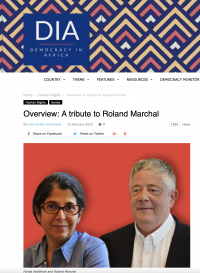
“Roland Marchal au travail : Les multiples facettes d’un chercheur tout terrain”, Sociétés politiques comparées, n°49, 2019.
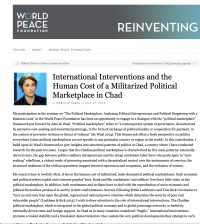
“International Interventions and the Human Cost of a Militarized Political Marketplace in Chad”, Contribution to the blog “Reinventing Peace”, World Peace Foundation/Fletcher School at Tufts University, 2014.
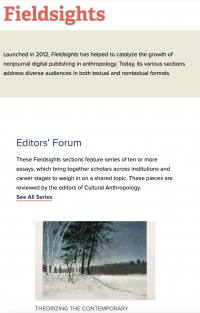
“‘Hate’ and ’security vacuum’: How not to ask the right questions about a confusing crisis”, Fieldsights: Hot Spots on the Central African Republic, Cultural Anthropology Online, 2014.
Research reports and policy papers
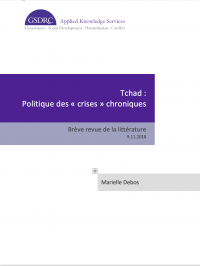
Politique des “crises” chroniques au Tchad, Birmingham, UK : GSDRC, University of Birmingham, 2018.
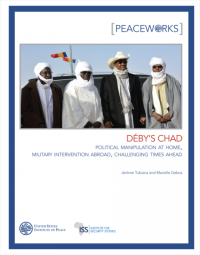
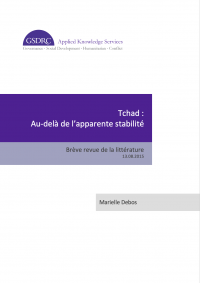
Tchad : Au-delà de l’apparente stabilité, Birmingham, UK : GSDRC, University of Birmingham, 2015.
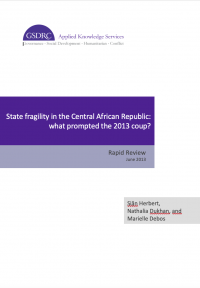
State fragility in the Central African Republic: What prompted the 2013 coup?,
Birmingham, UK : GSDRC, University of Birmingham, with Siân Herbert and Nathalia Dukham, 2013.
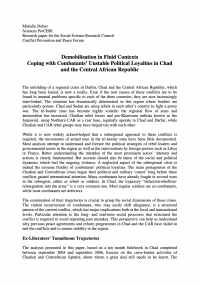
Demobilization in fluid contexts: Coping with combatants’ unstable political loyalties in Chad and the Central African Republic, Conflict Prevention and Peace Forum, SSRC, 2007.
Book reviews
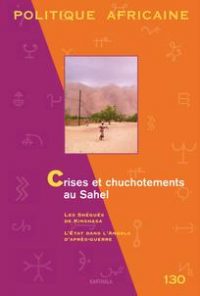
“Débat autour d’un livre : The War Machines de Danny Hoffman”, Politique africaine, n°130, 2013, pp. 225-247,
with Mariane Ferme, Paul Richards, and Danny Hoffman.
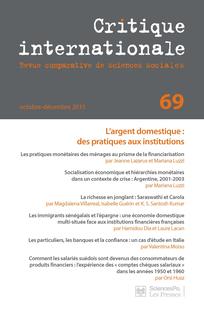
“La diffusion de la justice transitionnelle en Colombie”, Institut Universitaire Varenne, LGDJ, Paris, 2014, Critique Internationale, n°69, 2015, pp. 189-192.
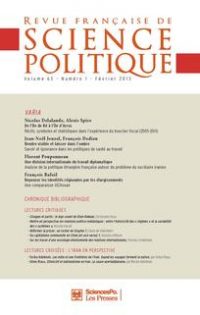
“Guichaoua Yvan (ed.), Understanding Collective Political Violence, Basingstoke, Palgrave Macmillan, 2011”, Revue française de science politique, n°7, 2013, p.133-135.
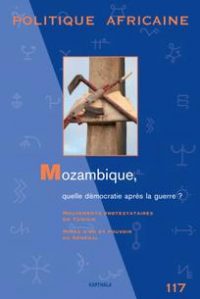
Caron Louis, Au Sahara tchadien : L’administration militaire au moment de l’indépendance, Paris, L’Harmattan, 2008”, Politique africaine, n°117, 2010, p. 188.

“Acheikh Ibn Oumar”, Maitron Afrique: Biographic dictionary of mobilizations and contestations in Africa, 2022.

“Acheikh Ibn Oumar”, Maitron Afrique: Biographic dictionary of mobilizations and contestations in Africa, 2022.